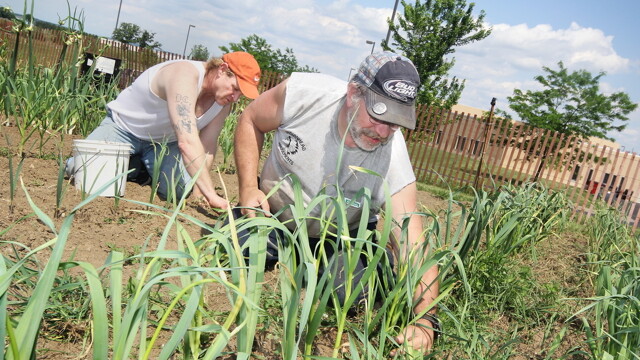Growing Hope
program teaches inmates how to grow their own grub
Bailey Berg, Andrea Paulseth |

Inmates at the Dunn County Jail are growing – in more ways than one.
Roughly 20 Huber Inmates have become some of the biggest benefactors in Menomonie, having donated several thousands of pounds of produce to the local food pantry, all of which has been grown in a plot behind the Dunn County Jail.
Dunn County Jail’s Food Security Coordinator Trevor Peterson is excited to start another season of growing with the inmates.
“The inmates really enjoy working in the garden,” Peterson said. “They get the privilege of working outside, and have something positive to talk about.”
The enterprise was initially spearheaded in 2009 by a group within the Dunn County Jail’s Literacy Program, which brought the idea to the higher-ups at the jail.
Peterson said the idea resonated with the jail big-wigs, so they supported the project by allotting the inmates a 60-by-90-foot plot behind the Judicial Center. In the next year, the Huber Inmates devoted a collective 210 hours of work to grow over 900 pounds of vegetables, herbs, and even melon – all of which was donated to the Stepping Stones Food Pantry.
“The project just blossomed from there,” Peterson said. “We did what we could with the resources we had, and won over more support.”
The following year the size of the garden tripled, as did Huber Inmate involvement. Over the course of the growing season they put in nearly 700 hours of work, this time producing 1,663 pounds of produce (worth an estimated $2,478) for both the food pantry and the jail kitchen.
“Initially it was just the food pantry, and then we started saying, ‘Well, the jail kitchen is right there, we can see it from the garden. Why not grow our own produce instead of buying it?’” Peterson said. “It’s become a great reward for the inmates, knowing that they’re supplying themselves and the other residents. It’s something they can be proud of.”
They are also in the process of working with Meals on Wheels to expand their generosity.
“We’re looking for ways to create a greater impact on the community with the food that comes out of the garden,” Peterson said.
Peterson said the garden, which was initially created to help others in need, beautify the area, and provide an outlet for the inmates has grown into something much bigger then they’d originally anticipated.
“There is a lot of healing to be done in the garden,” Peterson said. “The people who come to the jail are at a low point in their life – they’re sent to the facility for a reason – but being able to go out and work for a purpose in the garden gives them a chance to heal. Shoveling wheel barrel after wheel barrel of compost gives you time to reflect.”
Peterson also credits the garden with creating memorable and lasting friendships for the inmates and volunteers, as well as providing the inmates with a myriad of marketable skills.
“I know not all of them are going to leave here and get a job as a landscaper or a gardener,” Peterson said. “But they will have learned the skills – confidence, respect, the ability to show up on time and follow rules – that will translate to any job, and that’s what we’re trying to give them.”
This year the helping hand of the inmates will reach a little bit further with the advent of a community supported agriculture (CSA) program.
In the past, members of the community have been able to volunteer time and donate seeds and money for the cause, but the CSA program will take it one step further. Individuals can sponsor a CSA, which will target the families that need food the most, and ultimately share with them the bounty of the harvest.
“Our inmates have come to be the most charitable members of the community,” Peterson said. “Nobody is forcing them to be out there. They’re all volunteers who are working willingly. It shows what can be done in an institution when there is the opportunity to grow.”
If you’d like to donate time or resources contact Claudia Manning at 715-949-1664 or cmanning@lvcv.org.


















